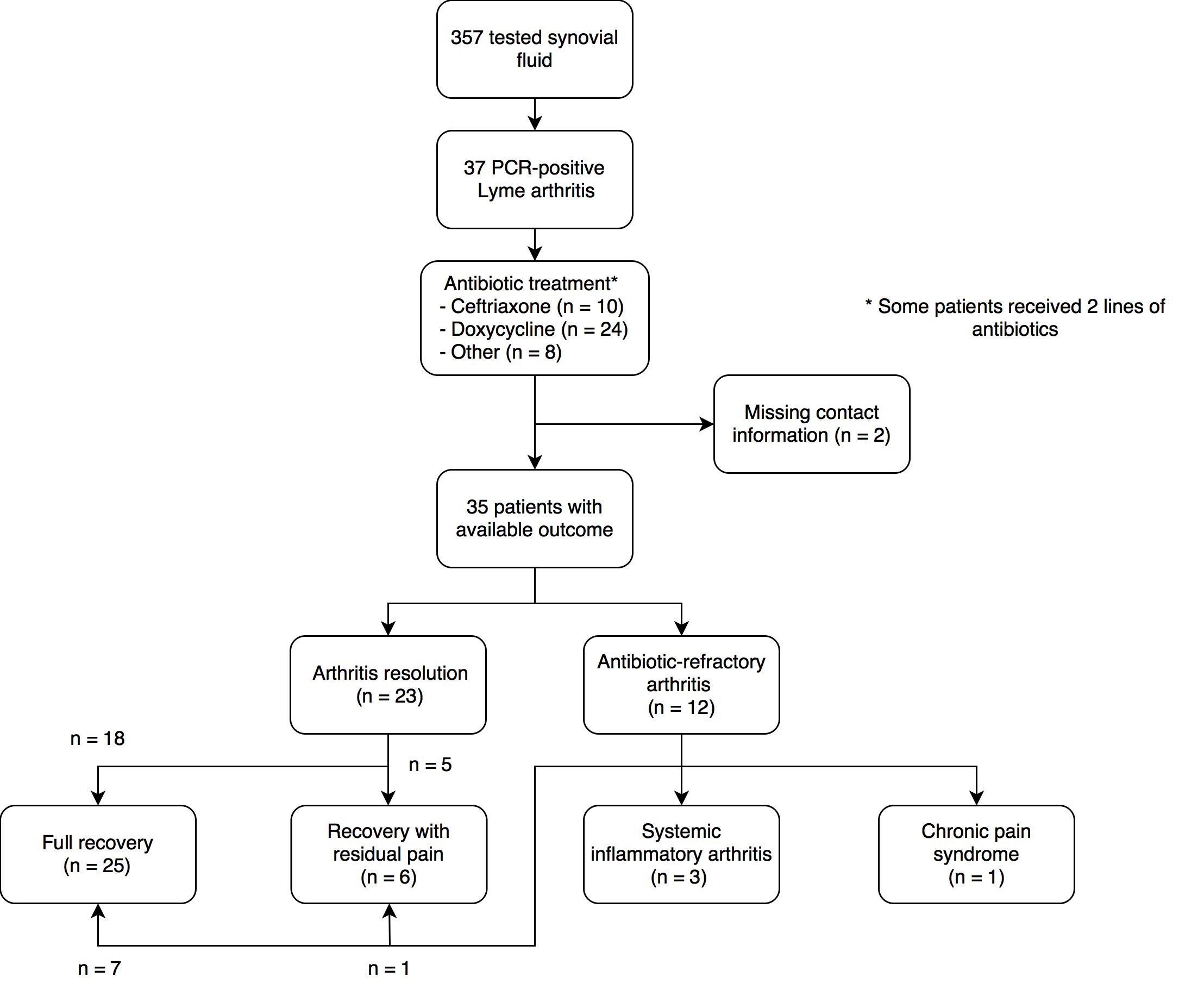Session Information
Date: Sunday, October 21, 2018
Title: 3S104 ACR Abstract: Infection-Related Rheumatic Disease (946–951)
Session Type: ACR Concurrent Abstract Session
Session Time: 4:30PM-6:00PM
Background/Purpose: Lyme arthritis (LA) is a disseminated Borrelia infection whom prevalence is lower in Europe than in the USA, probably because of difference in Borrelia species ecology. Few data concerning treatment efficacy and long-term outcome of LA in Europe are available. The aim of our study was to describe clinical characteristics and treatment outcomes of a national cohort of patients with LA confirmed with synovial fluid PCR.
Methods: We conducted a retrospective observational study using the French Borrelia reference centre database. Patients presenting with a PCR positive for Borrelia DNA in their synovial fluid between 2011 and 2016 were included. PCR-positive patients were offered by their referring physician to participate to a standardized telephonic interview. Patients’ medical files were also retrieved. The main objectives were to describe patient characteristics, disease presentation and outcomes after antibiotic treatment.
Results: Between 2011 and 2016, among 358 synovial fluids tested at the national reference center, 37 were positive for Borrelia DNA. Among these patients, 35 were contacted (2 missing contact information). Median age was 36 years with 31% minors and 63% men. Tick exposure was reported by 88% patients whereas tick bite and erythema migrans were only reported in 40% (10/25) and 14% (3/21), respectively. The presentation was monoarticular in 91% (32/35) cases and oligoarticular in others. The knee was involved in 97% (34/35) cases and 21% presented fever. The diagnosis was often delayed with a median time from symptom onset to diagnosis of 3 months (range 1 to 112, figure 1). The serology performed before or at the time of the PCR testing was IgG-positive in all cases but only in IgM-positive in 40%. All but one positive IgG serologies were also positive with Western-Blot. In the synovial fluid, the identified species of Borrelia were B. burgdorferi sensu stricto, B. garinii and B. afzelii in 54%, 29% et 17% of cases, respectively. Antibiotics prescribed were mostly doxycycline and ceftriaxone in 17 and 9 patients, respectively, sometime in combination. Follow-up data were available for 35 patients with a median follow-up time of 27 months (range 1-73). Although proper antibiotic treatment, 34% (12/35) of patients had persistent synovitis lasting at least 2 month justifying intra-articular glucocorticoid use in 75%, with good efficacy. Three patients developed chronic inflammatory arthritis leading to the introduction of DMARDs with good outcomes.
Conclusion: Our study present the biggest European cohort of PCR-positive Lyme arthritis. Although proper antibiotic treatment, one third of patients developed persistent synovitis of the affected joint necessitating anti-inflammatory medication and a small proportion of patients developed inflammatory oligo or polyarthritis justifying DMARD introduction.
To cite this abstract in AMA style:
Scherlinger M, Grillon A, Sibilia J, Jaulhac B, Arnaud L. Clinical Characteristics and Outcome after Treatment of a National Cohort of PCR-Positive Lyme Arthritis [abstract]. Arthritis Rheumatol. 2018; 70 (suppl 9). https://acrabstracts.org/abstract/clinical-characteristics-and-outcome-after-treatment-of-a-national-cohort-of-pcr-positive-lyme-arthritis/. Accessed .« Back to 2018 ACR/ARHP Annual Meeting
ACR Meeting Abstracts - https://acrabstracts.org/abstract/clinical-characteristics-and-outcome-after-treatment-of-a-national-cohort-of-pcr-positive-lyme-arthritis/

